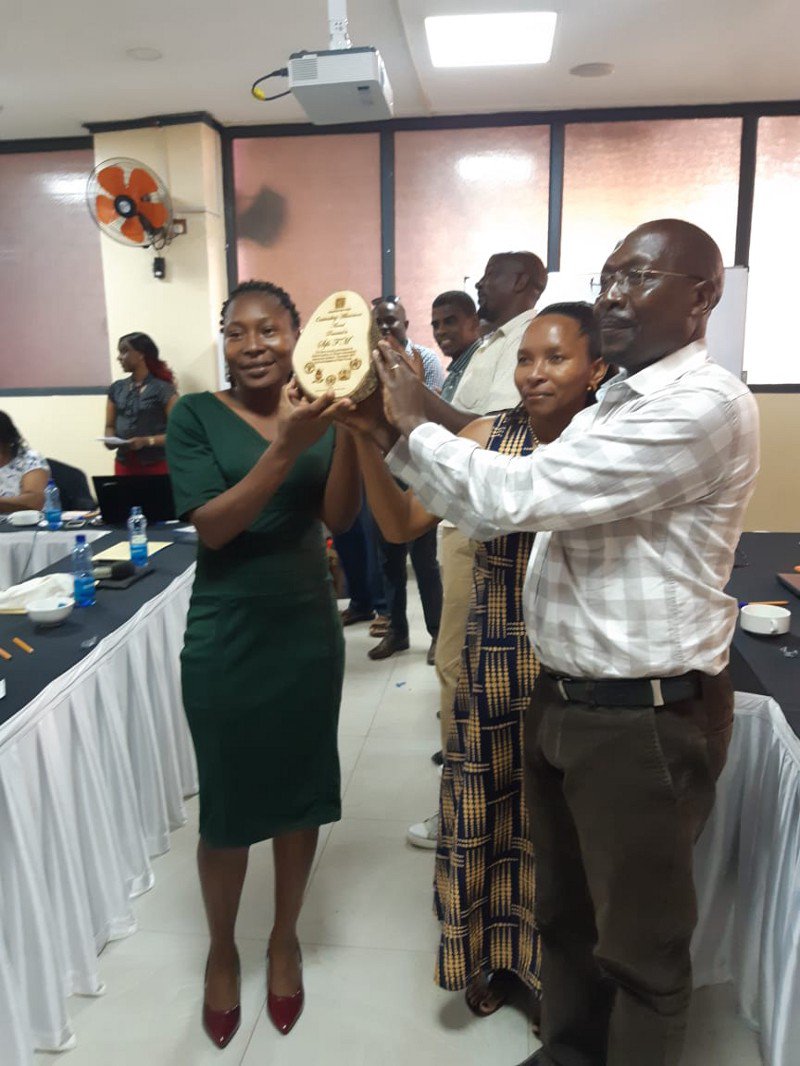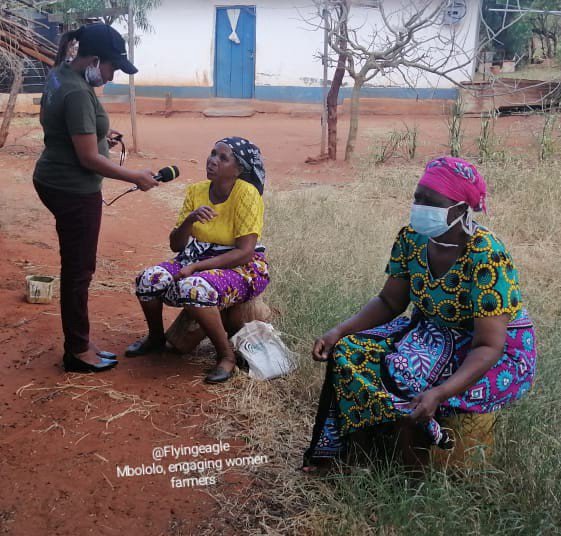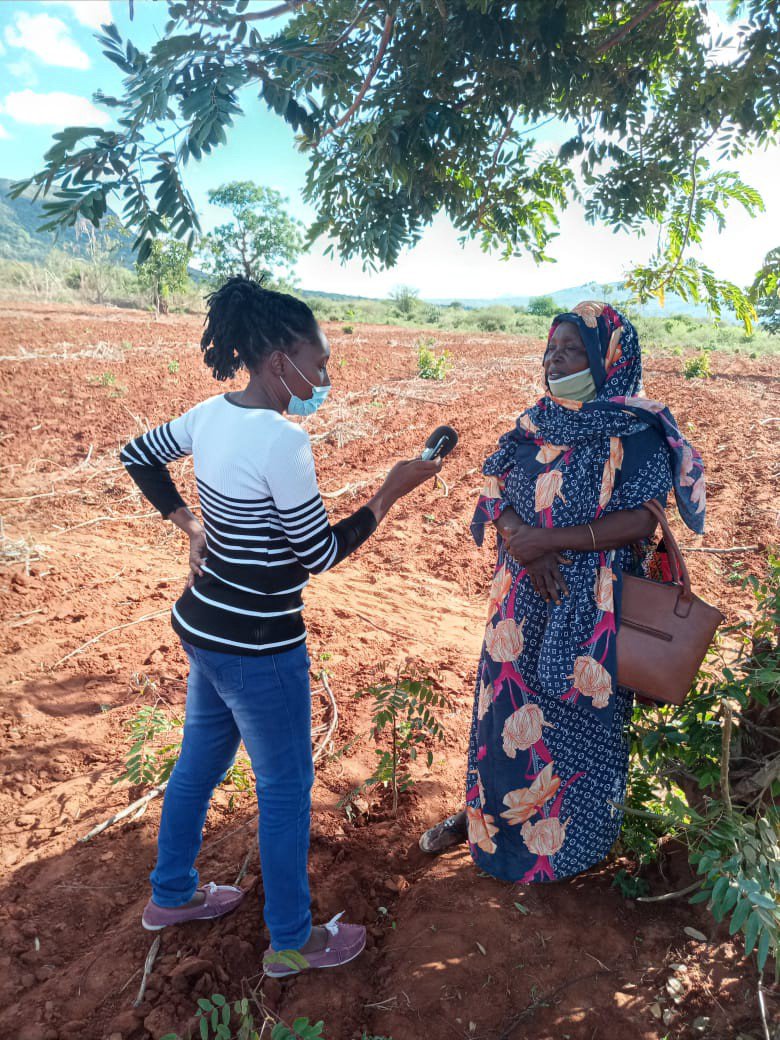Women in Weather and Climate Reporting
By Collison Lore
This year, the theme for International Women’s Day, “Women in leadership: Achieving an equal future in a COVID-19 world,” celebrates the tremendous efforts by women and girls around the world in shaping a more equal future and recovery from the COVID-19 pandemic and highlights the gaps that remain.
In Taita Taveta County, Kenya, two women journalists are championing ideas on ensuring that women are more included in weather and climate communication. Linda Akoth and Linah Mwamachi are journalists at Sifa FM in Voi and have worked closely with the IGAD Climate Prediction Application Centre (ICPAC), Kenya Meteorological Department (KMD), the World Meteorological Organization (WMO), Food and Agricultural Organization (FAO) and Farmer Field Schools at the grassroots level. These organizations all work within the context of the Agricultural Climate Resilience Enhancement Initiative (ACREI) (Ethiopia, Kenya, Uganda).

Linda and Linah receiving a climate award on behalf of their radio station, Sifa FM. This was during the March, April and May Season, 2020.
The goal of ACREI project is to develop and implement adaptation strategies and measures that will strengthen the resilience of vulnerable smallholder farmers, agro-pastoralists and pastoralists in the Horn of Africa to climate variability and change. The overall objective is improved adaptive capacity and resilience to current climate variability and change among targeted farmers, agro-pastoralists and pastoralist communities. The target project sites are Golaoda and Mieso in East and West Haraghe in Ethiopia, Taita Taveta County in Kenya, and Sembabule and Isingiro Districts in Uganda.
Linah Mwamachi and Linda Akoth are award winning journalists and have since 2019 worked extensively on matters of weather and climate communication in Taita Taveta County. Linda has placed focus on gender and climate reporting. She argues that the challenges facing women in receiving and using weather and climate information motivated her to report weather and climate issues for women, hoping to give space to women voices and highlight women who have made progress in mitigating the effects of climate change at the grass root level through news article and radio talk shows.
Linda states “In the process I met women in agriculture who shared their stories on challenges they face that hinder their progress. These women at the grassroots appeal other women leaders champion their interests and lobby for policies such as land ownership, access to clean water, health and food security, while ensuring that weather and climate communication is accessible to them”.

Linah in Mbololo location of Taita Taveta County. Here she is engaging these women farmers on matters of weather and climate discussing if they receive the weather forecast and if they understand the way the information is packaged and presented. She has also engaged farmers in different parts of the county in matters relating to food security and their views on the work of the Kenya Meteorological Department (KMD).
In one her visits to women farmers at Itinyi Village, Maungu Voi sub-county, the women, some of them widows shared their concerns about little support they receive, yet they constitute a high percentage of farmers in the county. Some of the challenges they highlighted were lack of seeds, fertilizers new farming technique because of impact of climate change to increase their farm produce as well as lack of good infrastructures especially during rainy season.

Linda Akoth speaks to Mama Sophia Kombo, a widow and farmer at Itinyi Village Maungu Voi sub county Taita Taveta. Women, children and sometimes the elderly in the community have weaker voices than middle-aged men in the science and politics of climate change.
Linah also of Sifa FM has championed the importance of co-production of weather and climate information. This process has seen, the media, the Kenya Meteorological Department, civil society organizations, FAO and farmer representatives participate in co-production.
Linah argues that co-production leads to the co-development of solutions. As stated previously, women provide the bulk of the labour on farms yet they have little or no access to weather and climate information. It is essential therefore that their input and voices be included in the co-production process. This is important because as key stakeholders in the county they together with other actors, can build on the identified issues to focus on a collaborative effort that will lead to the development of solutions. Co-development should support ongoing feedback from those actors using the co-developed output in order to continually improve the delivery of weather and climate services, she concludes.
The efforts of Linda and Linah are geared towards promoting, user-friendly weather and climate information services that are vital in helping communities cope with the changing climate and increasing risks of disasters, food insecurity and lack of water access. Based on societal structures in different parts of Kenya and indeed globally, women regularly need different types of weather and climate information than men, or may access and use it differently. Critical issues such as access and control of the household radio, where women have access but no control in listening means they are deprived of valuable weather and climate information and stakeholders need to work towards addressing such challenges in weather and climate communication in the context of women empowerment.
The approaches adopted by the two journalists will hopefully raise awareness and provide a platform through which good practices and concrete actions to empower women to produce and use weather and climate services at the grassroots level can be enhanced. Perhaps then within the context of their communities, can the steps needed to close the gap in the use of weather and climate services by women be taken.
